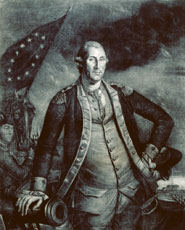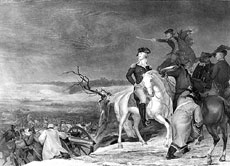 |

The Revolutionary War
|
 |


THE REVOLUTIONARY WAR
 |
 |

George Washington by Charles Willson Peale, mezzotint, 1780
National Portrait Gallery, Smithsonian Institution
|
 |
The Second Continental Congress, meeting in Philadelphia, appoints Washington commander-in-chief of the Continental Army. He accepts, saying, “I beg it may be remembered by every gentleman in the room, that I this day declare with the utmost sincerity, I do not think myself equal to the command I am honored with.” He asks for reimbursement of expenses, but he will not take any pay.
Washington hurries to Boston, where he finds a ragtag army of 14,500 men, untrained, undisciplined but, in his words, “able bodied, active, zealous in the cause and of unquestionable courage.”
|
 |
Five days after the Declaration of Independence is issued, Washington assembles his troops at his New York headquarters to hear the document read because he wants his men to know the meaning of the war.
British troops land on Long Island and drive the Continentals across New Jersey into Pennsylvania. “Our situation is truly distressing,” he writes in a report to Congress. “...Great numbers of them have gone off; in some instances, almost by whole regiments...”
On Christmas night, in a blizzard, he leads his men across the ice-flecked Delaware River to Trenton, NJ, surprises a drunken Hessian garrison, and seizes Trenton for a time. Washington slips away to Princeton, where he strikes the British rear. Leading the attack on his horse, he shouted: “Parade with me, my brave fellows!” And when the British lines break, he leads the charge with another shout: “It is a fine fox chase, my boys!”
|
 |
The British occupy Philadelphia and defeat Washington in indecisive battles. Washington adopts a strategy to hold off the British: “Avoid a general Action,” never “put anything at Risque.”
He marches 11,000 men, many barefoot, into grim winter quarters at Valley Forge. Foragers roam the countryside in search of grain and livestock. He orders the inoculation of every soldier against smallpox and maintains harsh discipline. In spring, his men emerge hardened and spoiling for a fight.
|
 |
In the first recorded celebration of Washington’s birthday, a band at Valley Forge serenades their general.
Washington attacks a British force leaving Philadelphia for New York. When a general retreats instead of attacking, Washington dresses him down, swearing at him “till the leaves shook the trees,” a soldier later says. Then Washington takes command. “His presence stopped the retreat,” a staff officer writes. “...by his own presence, he brought order out of confusion, animated his troops, and led them to success.”
France recognizes American independence and gives Washington what he and Ben Franklin, American diplomat in Paris, had been hoping for: the aid of the French navy.
The British, following a “Southern strategy,” take Savannah, GA.
|
 |
 |

Washington passing the Delaware, the evening before the Battle of Trenton, December 25, 1776, by George S. Lang, engraving, 1825
Library of Congress
|
 |
Washington discovers that Major General Benedict Arnold, who had been a brave and shrewd officer in many battles, is a traitor: Arnold has agreed to surrender West Point, key fort on the Hudson River, for money and a commission in the British army.
Washington, who often takes direct charge of intelligence gathering, had set up a spy network that helped to reveal Arnold’s treason. He escapes, but Washington authorizes the hanging of Arnold’s case officer, Major John André, a British officer who spied in civilian clothes.
|
 |
The first public celebration of Washington’s birthday as a holiday is ordered by General Jean Baptiste de Vimeur, comte de Rochambeau, on February 12, who gives French troops in Rhode Island the day off. ( That day was a Monday. February 11, Washington’s birthday by the Julian Calendar, happened to fall on Sunday that year.)
Washington, patiently waiting for a decisive battle, gets it when he races south and, in a superbly coordinated operation with French land and naval forces, traps the army of General Charles Cornwallis at Yorktown, VA. Cornwallis surrenders on October 19, effectively ending the war.
|
 |
A peace treaty is signed between Great Britain and the United States.
|
|




